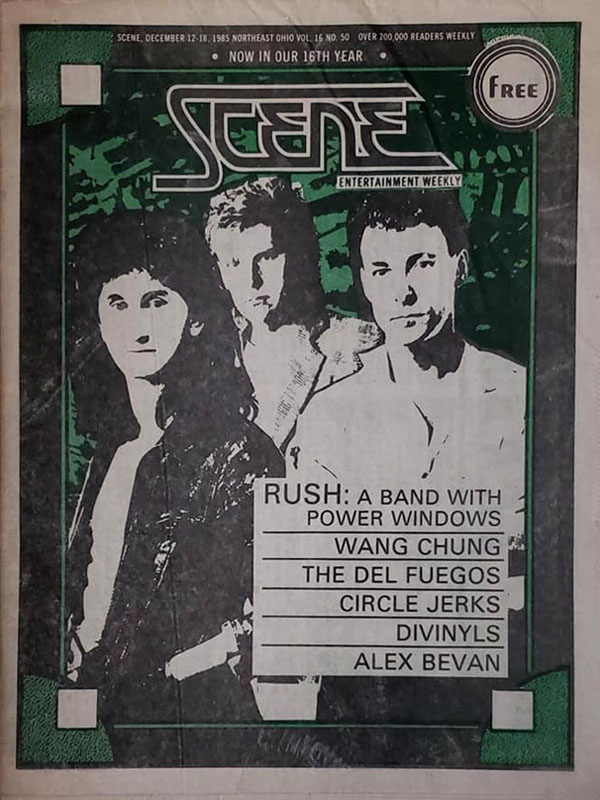Rush: A Band with Power Windows
By Rex Rutkoski, Northeast Ohio Scene, December 12, 1985, transcribed by John Patuto

The Toronto morning is cold, and Alex lifeson reacts with a shudder.
Rush's guitarist seems to warm quickly, though, to the conversation.
He talks, in a relaxed manner, about things musical and non-musical, never implying to his interviewer that he may be in the midst of a harried schedule.
He speaks, admiringly, of bandmate Neil Peart's passion for cycling and swimming, a passion that includes a minimum of 100 miles of cycling on days off.
He talks of the continual "hunt for something of interest," and mentions his own attraction to "a bit of flying," scuba diving and, just recently, painting.
"There is a constant battle against boredom on the (touring) road," he reminds.
That road is what Lifeson, drummer Peart, and vocalist Geddy Lee once again are currently frequenting, having recently released a new album, Power Windows.
The Canadian trio have been making albums since their thundering debut in 1974, and have since built a reputation for fusing the power of rock with intelligent subject matter.
The new album treats such varied topics as those who change the course of history "for evermore" ("The Manhattan Project"), coping with "Middletown Dreams," financial politics ("The Big Money"), and a divided world ("Territories").
Lifeson talks of the creative process for Rush, an interesting one which involves Peart writing the lyrics while Lifeson and Lee create the music, and sometimes even using taped concert sound check jams for inspiration.
"There is no real set pattern (on how a Rush song is created)," he says. "Often Neil will have a piece written before we go in (to the studio). He writes and we write and we get together in the afternoon and discuss the direction we have been going into.
"Sometimes we have to shelve the lyrics or music until we find something more compatible. A great deal of discussion goes on at the end of the day, as to what fits what." Lifeson says that Rush does try to view each new album release as their best LP to date, "and so (an artist) should, I think."
"After you live with it for three or four months, there are always things you want to change," he says. "I suppose that is a sign of progression. If you don't want to change, I suppose you are in trouble."
Rush made a change on Power Windows, going with a new producer, Peter Collins.
"We wanted a fresh and new direction," Lifeson explains. "Peter was the exact type of producer we were looking for. We wanted somebody who had more of a musical background and thought in terms of songs, rather than sound. Our sound department was already taken care of."
Lifeson adds that the group also wanted to change the sound of the record and the environment. "I think we achieved all the goals," he says.
He insists that thoughts of videos do not influence the song writing process. "Those decisions (about videos) come after the record is completed," he says. "Videos are very secondary."
Just as Rush labors to improve their albums, so, too, do they approach their concerts.
"We are constantly trying to embellish the show one step further each tour," Lifeson says. "With this tour there are more visuals, animation and we're going on the road with our own stage for the first time."
If Lifeson seems comfortable, happy even, with Rush's place in the rock world, he has reason to be. Power Windows is a major hit and Rush is a major arena touring act.
He admits that when he was in on the founding of the trio, he did not envision that Rush would evolve into the band that it is today.
"No, I was just looking at the next gig," he says. The whole idea of playing in a band at that time was to have fun, to play music and have a good time. Eleven years later we are still slugging it out."
That slugging can continue indefinitely, he says, unless the members one day decided "it wasn't happening or satisfying or the interest wasn't there."
"I think we've been fortunate," he says, "in that we write our own ticket. We established our way of doing things long ago. We write the music we feel we should be writing. The record company accepts and respects that. They take the record and try to promote it to the best of their ability.
"That's an uncommon thing and I think we are very lucky for it. We have always managed to do things our own way and have been able to be successful commercially."
Financial success, he adds, "is nice, but anybody can do that. To be successful with myself personally is far more important. You have to be happy with what you are doing and are accomplishing... There are a million things to do in the world, and I'd like to try at least 100,000 of them."